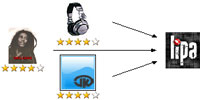 If you are a drug dealer or the agent of a national security group or of some kind of watchdog group or human rights organization or if you are a practicing socialist/communist spy, you are in the wrong place. You will be disappointed and should leave now...
If you are a drug dealer or the agent of a national security group or of some kind of watchdog group or human rights organization or if you are a practicing socialist/communist spy, you are in the wrong place. You will be disappointed and should leave now...
From sonic renderings of sleep-deprived hallucinations, we now move to visually-enhanced tributes to Cold War espionage ephemera... Net Pirate Number Station is an updated version of the intelligence community shortwave stations that used to broadcast blandly intoned sequences of numbers during the height of the Cold War; stations that were documented and immortalised by the Conet Project. In the NPNS version, the numeric sequences are generated from text that is scraped from random porn and gambling sites, and we actually get to see the announcers who reel off the numbers in appropriately robotic fashion.
As a form of online entertainment, it may not set the pulse racing, but if you're looking for hypnotic mental disengagement with subliminally sinister undertones, then its just the ticket. (via Metafilter)
 With my broadband connection hopefully up and running in the next couple of days, I might start availing myself of this wonderful little service… Basically, it’s a net radio station based on the playlists of users. A program called Audioscrobbler (which compiles a list of songs you listen to and suggests songs of a similar style) sifts through these playlists and singles out those which contains songs you might like. These are then played to you through the site. It’s the ultimate democratization of the “airwaves”; a system that turns ever listener into a DJ. And, what’s more, its all completely free! (Although, I would recommend you make some sort of a donation.)
With my broadband connection hopefully up and running in the next couple of days, I might start availing myself of this wonderful little service… Basically, it’s a net radio station based on the playlists of users. A program called Audioscrobbler (which compiles a list of songs you listen to and suggests songs of a similar style) sifts through these playlists and singles out those which contains songs you might like. These are then played to you through the site. It’s the ultimate democratization of the “airwaves”; a system that turns ever listener into a DJ. And, what’s more, its all completely free! (Although, I would recommend you make some sort of a donation.)
 In the West African nation of Mali, community radio plays a central role in keeping the often non-literate people of rural areas informed about local and national issues. The problem for these stations, however, is that they are often as isolated from traditional news sources as their listeners, so providing coverage of national news (let alone world news!) can often be quite difficult... In an attempt to make this task easier for Malian community broadcasters, Canadian IT volunteer, Ian Howard, has the spent last six month setting up low-end computers in their studios with suites of open source software that will support wireless Internet connections. As a result, these stations will not only gain access to the sorts of Web-based news services that you and I take for granted but, in time, it is hoped that they might even start up their own streaming net radio stations (which would be a great way for Malians living abroad to stay in touch with what was happening back home.)
In the West African nation of Mali, community radio plays a central role in keeping the often non-literate people of rural areas informed about local and national issues. The problem for these stations, however, is that they are often as isolated from traditional news sources as their listeners, so providing coverage of national news (let alone world news!) can often be quite difficult... In an attempt to make this task easier for Malian community broadcasters, Canadian IT volunteer, Ian Howard, has the spent last six month setting up low-end computers in their studios with suites of open source software that will support wireless Internet connections. As a result, these stations will not only gain access to the sorts of Web-based news services that you and I take for granted but, in time, it is hoped that they might even start up their own streaming net radio stations (which would be a great way for Malians living abroad to stay in touch with what was happening back home.)
(The Canadian geek behind this was sent over there by Geekcorps, an non-profit organisation that sends IT professionals off to do similarly worthwhile project in developing nations around the world. Read more about them here.)